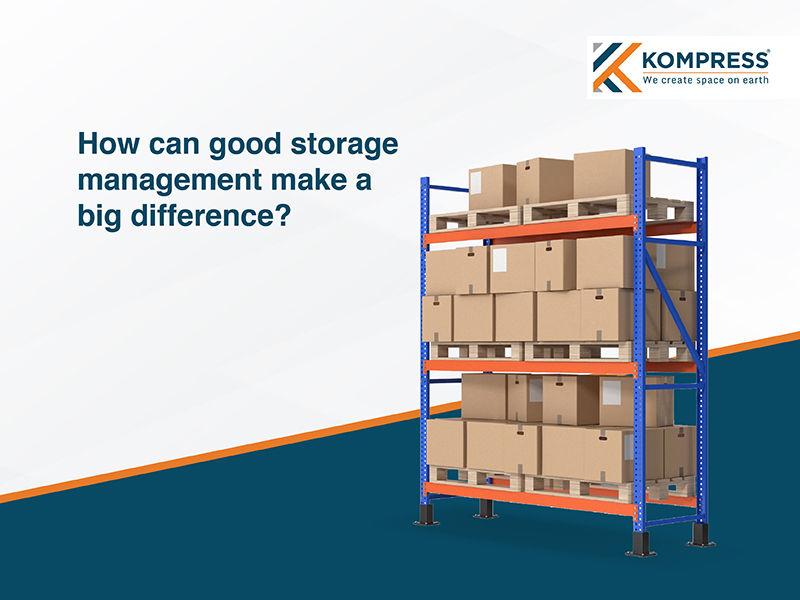
In today's fast-paced business world, effective storage management is a critical yet often overlooked aspect of operational success. Whether you're running a small e-commerce startup or managing a large manufacturing facility, how you handle your storage can significantly impact your bottom line. Good storage management goes beyond simply organising items on shelves; it encompasses a holistic approach to space utilisation, inventory control, and operational efficiency.
Lets first understand the drawbacks of poor storage management. It has proven to be a silent productivity killer in any organisation. One of the most visible issues is the inefficient use of space, where vertical storage potential goes untapped and disorganised areas create pockets of wasted room. As space becomes scarce, businesses may hastily invest in expensive expansion or additional storage facilities, overlooking the potential of their existing resources. Moreover, disorganised storage areas significantly hamper operational efficiency. Employees waste valuable time searching for misplaced items or navigating through cluttered spaces, leading to delays and frustration. This inefficiency not only reduces productivity but can also impact employee morale.
Effective storage management begins with maximising every square foot of available space. By implementing vertical storage solutions and appropriate shelving systems, businesses can dramatically increase their storage capacity without expanding their physical footprint. This optimisation goes beyond simply stacking items higher; it involves strategic planning of storage layouts to ensure easy access and efficient item retrieval.
When storage is well-managed, it acts as a catalyst for overall operational efficiency. Well-organised storage areas with clear labeling and logical item placement significantly reduce the time spent on picking and restocking. This enhanced efficiency not only boosts productivity but also reduces labour costs.
One of the most tangible benefits of good storage management is the substantial cost savings it generates. By optimising space utilisation, companies can significantly reduce their storage-related expenses, such as rental costs for additional facilities or utilities for maintaining larger spaces.
Efficient storage practices also reduce the likelihood of product damage, cutting down on write-offs and waste. Over time, these savings can amount to a significant boost in profitability, allowing businesses to invest in growth initiatives or pass savings on to customers for increased competitiveness.
Well-organised storage areas reduce the risk of accidents, such as trips and falls or items falling from heights. Proper storage of hazardous materials, with clear labeling and dedicated areas, is essential for worker safety and environmental protection.
The impact of efficient storage management extends beyond the warehouse to directly influence customer satisfaction. By consistently meeting or exceeding customer expectations in order fulfillment, businesses can build loyalty and positive word-of-mouth, driving long-term growth.
The foundation of effective storage management lies in adopting modern, innovative storage systems tailored to your specific needs. For example, Automated storage and retrieval systems (AS/RS) represent a significant leap forward. These robotic systems can handle the storage and retrieval of items with speed and accuracy far beyond human capabilities, operating 24/7 with minimal errors.
While technology plays a crucial role, the human element remains vital in storage management. It is important to conduct staff training on the best practices and the use of new systems.
Also, the power of data analytics in optimising storage management cannot be overstated. By analysing data from various sources – inventory movements, order patterns, seasonal trends – businesses can make informed decisions about storage layouts and inventory levels.
Predictive analytics can forecast demand fluctuations, enabling proactive adjustments to storage and inventory strategies. This data-driven approach extends to workforce management as well, with analytics helping to optimise staffing levels and task assignments based on historical and projected workloads. The key to successful data analytics in storage management is not just collecting data, but translating it into actionable insights that drive tangible improvements in efficiency and cost-effectiveness.
Good storage management is a crucial driver of business success. From optimising space utilisation and improving inventory control to enhancing operational efficiency and customer satisfaction, the benefits of effective storage management permeate every aspect of business operations. In today's competitive business landscape, where margins can be tight and customer expectations are ever-increasing, the advantages gained through superior storage practices can provide a significant edge.
As you consider the potential for enhancing your storage management, remember that you don't have to navigate this journey alone. Kompress India Pvt Ltd is here to help you unlock the full potential of your storage operations. Our team of experts is ready to provide a comprehensive assessment of your current storage setup and work with you to design and implement solutions that drive real, measurable improvements in your business.


 kompressindia.com
kompressindia.com